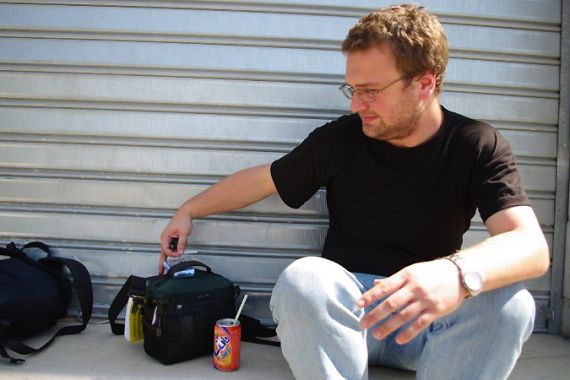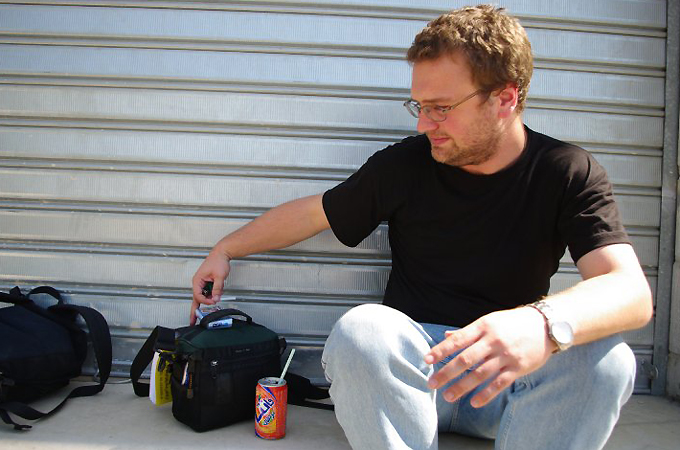NZ journalist deported from Yemen
Glen Johnson, a freelance journalist held in southern Yemen for two weeks, has been released, his family says.

 |
| Glen Johnson has been reporting from the Middle East for international and New Zealand media |
A New Zealand journalist arrested in Yemen last month has been released and deported to the United Arab Emirates, according to his family.
Glen Johnson, a freelance reporter based in the Middle East, was arrested on June 25 while investigating a story on the human trafficking trade from Africa to the Middle East.
The events leading to his release remain unclear, but it is known that he was moved to an immigration facility in the Yemeni capital, Sanaa, on Tuesday night.
Speaking to his family on Tuesday for the first time since his detention, Johnson said he was exhausted but had not been harmed during his imprisonment.
He was due to arrive in Dubai on Wednesday on an Emirates flight, EK 962. The New Zealand authorities received confirmation that he was onboard the flight. His family is waiting to hear that he has arrived in Dubai.
His father, Mike Johnson, told Al Jazeera by phone that his family was “ecstatic” that the journalist had been released.
“We’re just happy that he’s out of Yemen,” Mike Johnson said. “We’ve appreciated those within the media that have helped Glen.”
On Friday, a Yemeni official told Al Jazeera that Johnson had been arrested in the southern port town of Lahij for “illegal entry” and that he was to be deported.
There was concern, however, when this process appeared to have been delayed due to heavy fighting in the south of the country and ongoing protests in the capital.
The Yemeni government, does not have full control of the part of the country where Johnson had been detained and he was not transfered from prison to immigration facilities until Tuesday.
Fighting between government forces and separatist fighters in the nearby province of Abyan included intensive air strikes in recent days, with dozens reported dead.
New Zealand, which has no diplomatic representatives in Yemen, had received help from the British and Canadian embassies in the Arabian peninsular state.
The 28-year-old has been based in Egypt since January, and had reported on the situation there for international publications including Le Monde Diplomatique and the International Herald Tribune. He also writes for several New Zealand media outlets.
Prior to moving to Cairo, he did a stint working for a newspaper in Turkey. He has also spent time in the West Bank and in Jordan.
The last piece filed by Johnson, on New Zealand’s contribution to the UN peacekeeping force in Sudan, was published in the Herald on Sunday, a weekly New Zealand newspaper.
Ordered to leave
It is not the first time Johnson has drawn the attention of Yemen’s immigration authorities.
A year ago, when he was in Yemen reporting on sexual abuse, the country’s national security bureau ordered him to leave the country within 72 hours.
A FaceBook page calling for Johnson’s release had drawn 460 “likes” at the time of his release, and a Twitter campaign under the #FreeGlen hashtag had taken off on the Twitter microblogging website.
Ashraf Alrifi, secretary of freedom committee at the Yemeni Journalists’ Syndicate, told Al Jazeera that the past six months could be considered the most difficult time for Yemeni journalists, with the highest amount of violations against press freedom since the country’s unification in 1990.
From January 1 to 30th June 2011, the syndicate registered 211 cases of press violation, with many additional cases still being investigated.
The Yemeni authorities stormed the Al Jazeera bureau in Sanaa, took most of the news network’s equipment, and deported two of its correspondents, Ahmed Muwaffaq Zaidan and Abdulhaq Saddah.
Authorites closed the bureau, sealing the premises with red tape. An arrest warrant was issued against Ahmed Al-Shalafi, and reporters have subsequently been refused entry to cover the unrest.
Similar raids have been carried out on Suhail TV, an opposition station. The army then shelled Suhail TV’s studios and destroyed its remaining equipment.
Yemeni journalists are unable to work in much of the country, particularly in areas controlled by security forces loyal to Saleh.
Reporters Without Borders (RSF by its French acronym) said on Monday that it was becoming increasingly difficult for media to cover the protests against President Ali Abdullah Saleh’s three-decade rule.
“Amid the chaos in Yemen, the authorities see control of news and information as essential,” Jean-François Julliard, the general-secretary of RSF said in a statement.
“By blocking the flow of information, the government manages to make the rest of the world forget that pro-democracy activists are also being killed or imprisoned in Yemen. It is time the international community ended its embarrassing silence on the situation in Yemen and assumed its responsibilities.”
Johnson is one of at least thirteen foreign journalists to be deported during the uprising in Yemen, according to the Yenemi Journalists’ Syndicate. There has been pervasive violence against local journalists, including physical attacks, kidnappings and censorship.
Two journalists – Mohamed Yahia Al-Malayia, a reporter for the Al-Salam newspaper, and Jamal Al-Sharabi, a photographer for the independent daily Al-Masdar – were killed while covering a peaceful demonstration in Sanaa on March 18.
Additional reporting from Khaled al-Hammadi